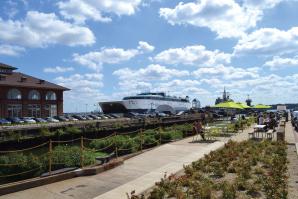I’m no Pollyanna when it comes to assessing our state’s problems, but I must admit I am weary of hearing endless complaints about California’s terrible business environment, its slow economic growth and its many disadvantages compared to states like Texas.
Yes, we do have challenges in doing business here, most notably higher costs. And yes, it is important that business leaders continue to fight for things like regulatory reform that could help bring down costs and simplify complexity.
Too often, though, naysayers focus on the negatives without examining the offsetting positives. The loudest voices come from the mass media: Forbes, for example, saying, “forget California,” when it rates states for business investment.
Dig deeper into more thoughtful analysis, however, and we find that the unfriendly picture of California is not quite what it seems to be.
Companies are not leaving the state en masse. In fact, according to the Public Policy Institute of California, from 1992 to 2006, less than 2 percent of all job losses in California were caused by businesses leaving the state.
Our companies do face higher costs, but they also enjoy many benefits. Among them are more productive workers (13 percent above the national average), a whopping 50 percent of all U.S. venture capital (Texas gets 5 percent), and some of the country’s best weather and most beautiful scenery (some of it saved by appropriate environmental protections).
There is an important caveat, however: Our own region, part of inland California, sees fewer of the positives. While the coastal economy is already enjoying a strong recovery from the recession, we lag behind, still facing sluggish growth and high unemployment.
That makes it even more tempting to blame our problems on the state of the state. But, California’s ills are only one part of our problem. We have long known our region suffers from its reliance on a few industries: government, agriculture, land development and construction. Government at all levels has been drastically downsized during the recession, agriculture employs relatively few, housing and construction are boom-and-bust industries, and we’re only slowly recovering from their latest meltdown.
So let’s stop wasting precious energy on bemoaning the challenges of doing business in California. That does not mean we diminish our efforts to reduce regulatory and other barriers to growth, which do, in fact, affect our region’s economic growth.
But, it does mean we must focus, first and foremost, on how we can develop the knowledge-based industries like those that give coastal California its robust, resilient economy — as our regional initiative “The Next Economy” is doing. Clearly, industries suited to our region — industries like health services, advanced manufacturing, clean energy technology, life sciences, and information technology — are far less affected by either national economic turmoil or the state’s business climate.
Second, we need to focus on supporting the educational institutions and opportunities that will help our residents to develop into the knowledge workers needed by these industries — and allow them and their families to thrive and remain here in our region.
Finally, we must remind ourselves and others that we all choose to live in California and in our region for good reasons. I can think of no other place I would rather be, and I suspect many of you would say the same.
So enough of the naysaying: Let’s celebrate our strengths and get on with the business of making our state and region an even better place to live and work.
Winnie Comstock-Carlson
Publisher
What do you think?
winnie@comstocksbusiness.com
Recommended For You

Go Time
Hey Sacramento, let’s stop talking and get something done.
You may have recently noticed some random references to JFDI. Maybe it was in a tweet or a sticker on the back of a cell phone. The initials stand for Just F*cking Do It. It isn’t a new movement or an acronym from a New York Times Best Seller. It represents an attitude, a mindset and — most importantly — an unwavering willingness to act.

Eat it Up
Why you should salivate over Sacramento’s farm-to-fork mantra
In October of last year, Sacramento Mayor Kevin Johnson declared Sacramento the “Farm-to-Fork Capital of America,” presenting the city with a long-term opportunity to build a distinct brand identity that could help the region attract and retain citizens, conventions, tourists and entrepreneurs. It’s especially valuable because a strong regional identity gives energy to the economic engines that make cities successful. Anyone needing proof can look directly to Austin, Texas.


